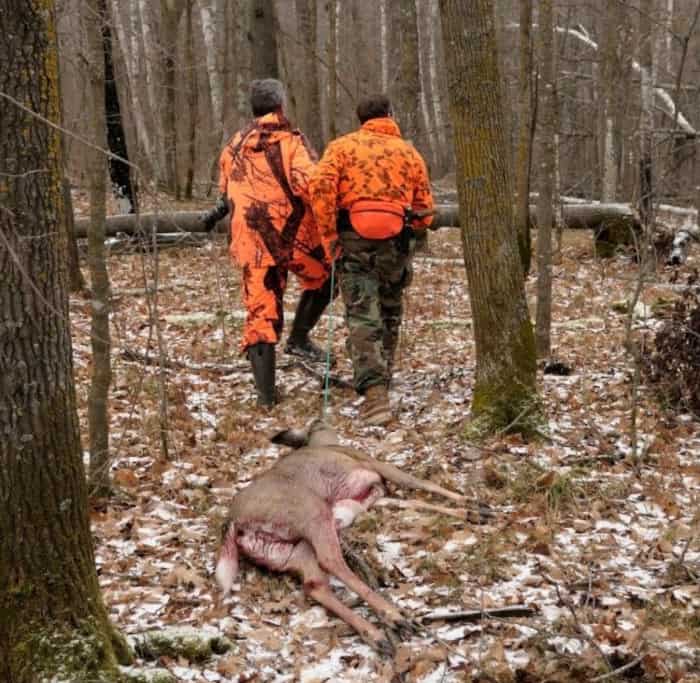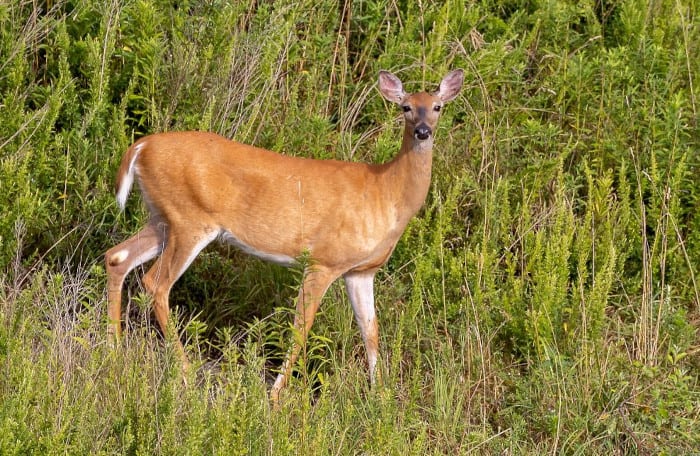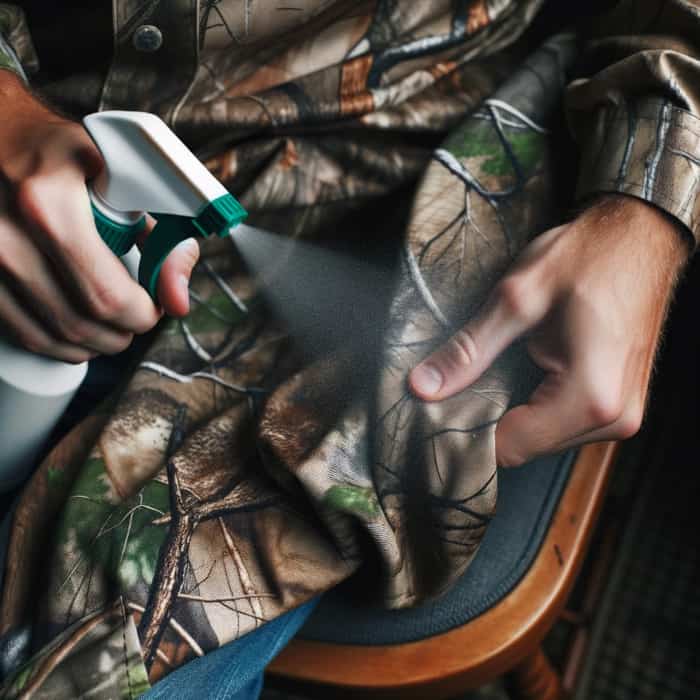Scent control is one of those topics that almost always trigger debates within the deer hunting community. Typically, most deer hunters fall into one of three categories when it comes to scent control:
- Those who believe in scent reduction and adhere to strict scent reduction processes.
- Those who believe in scent reduction but don’t practice it.
- Those who don’t believe in scent reduction at all.

I was introduced to deer hunting by some uncles who did not believe in or practice any human odor management. As a matter of fact, of the three uncles who took me deer hunting, two routinely smoked cigarettes while we hunted.
However, over the years, I’ve come to embrace deer hunting scent control as I believe that it can make a big difference in one’s deer hunting success. Now, have I harvested whitetails without any scent control measures? Absolutely. However, I have been more successful when employing scent removal or scent cover methods.
It’s also important to understand that it’s impossible to completely eliminate your odor molecules while hunting. It simply cannot be done, but deer hunters can take steps to reduce their scent footprint while hunting.
Another important point worth noting is that even the most aggressive scent reduction tactics are no guarantee that a whitetail deer won’t pick up your scent and spook. I prefer to look at odor control as a tool that increases the odds in my favor.
Finally, scent control can lead down a bit of a rabbit hole, especially if you’re a bit OCD like me. By that, I mean that as a deer hunter, you can get extremely granular in how you approach odor control and get almost overly caught up in the process.
For example, I have a hunting buddy who is one of the most detailed hunters I’ve seen when it comes to odor control with his hunting gear. He goes to great lengths to eliminate or cover up his smell while hunting. For example, he uses the following scent reduction methods:
Now his scent management approach is a little more in-depth than mine, as I’m not quite as dedicated as he is in that area. However, it’s hard to argue with his success and mature bucks on the wall that seem to validate his odor control methodology.
The Scent Control Debate
If you want to get a feel for the topic of scent reduction, ask 20 different deer hunters of different ages and experience levels if they practice scent reduction or control and why. The results are always interesting, as you’ll always have a few in the poll group who don’t use any kind of odor elimination control because they don’t feel it’s necessary.
Typically, they take this position because they’ve previously harvested whitetails without any scent elimination. And, if that’s true, it’s hard to argue with that logic, especially when I’ve also taken deer without any scent reduction or control (when I was a teenager). Heck, I shot my first deer while one of my uncles was smoking like a freight train in the deer blind.
Although you may see all kinds of scent-control products in the hunting store and see even more advertised online, the validity of scent reduction or elimination is still a hotly debated topic. That being said, the scent control market is a significant money maker in the hunting industry.
I couldn’t find any specific data about the amount that deer hunters spend on odor reduction, but according to the 2022 National Survey of Fishing, Hunting, and Wildlife-Associated Recreation report from the U.S Fish and Wildlife Service, hunters spent 3.9 billion dollars on “auxiliary equipment, including camping equipment, binoculars, and special hunting clothing,” Somewhere in that massive number is the spend data associated with scent-controlling products.
For me, the oddest part of that debate is all the scientific deer research confirming the strength and capability of a whitetail’s nose.
10 Common Odor Control Mistakes When Deer Hunting
If you are interested in reducing your odor while hunting, here are my 10 most common scent management mistakes that can derail a successful deer hunt in no specific order. Most of these are based on personal experiences combined with up-to-date research focused on scent management tactics.
To be transparent, I’ve made most of these mistakes before and still make some today. For example, I love coffee and typically hunt with a thermos of coffee in my pack, especially when I’m hunting in colder temperatures. As such, I end up with coffee on my breath for most of the hunt. However, I’m too stubborn and addicted to coffee to change my ways now.
Let’s dive in and see about ensuring a scent-free and successful hunt.

Mistake #1: Not Using Scent Free Soap, Deodorant, and Toothpaste
If you’re serious about reducing your human scent molecules in the field, it starts with reducing or covering up your body odor.
The easiest way to accomplish this reduction in BO is through the use of a scent-free soap or body wash. Now, using scent-free soap is a pretty common tactic for deer hunters. But, many hunters don’t think about their hair and breath, so they don’t utilize a scent-free shampoo or scent-free toothpaste. They bathe with a scentless soap but use their regular shampoo and toothpaste the night or morning of a deer hunt.
I follow these protocols but then cancel out the scentless toothpaste by drinking coffee in the field (as I mentioned previously).
Mistake #2: Failing to Properly Store Hunting Clothes
To be clear, I’m referring to how hunting garments are stored after they are washed and prepped for hunting.
Many deer hunters wash their hunting clothing in scentless or scent-free detergent before a hunt. That’s an excellent approach and one that I do as well.
The mistake comes into play when the hunter doesn’t properly store the clothes leading up to the hunt. For example, many hunters do the scent-free wash of their clothing but then hang the gear up in the closet or lay it out over a chair.
This approach allows an opportunity for clothing and gear to absorb any scent from the area where they are stored and potentially voids out the scentless laundry detergent.
The better approach is to place the washed and dried clothing in an airtight container to stop any potential odor absorption.
I do the following:
When the clothes are dry, I place them in a sealed plastic bag and place them in an airtight container. Then that container is transported to the field when I’m hunting.
This approach keeps any residual odor from my house or truck from affecting the clothes.
Mistake #3: Fueling the Vehicle on the Way to Hunt
I’ve been guilty of this many times and still, occasionally, forget to follow my own advice. I sort of stumbled on this issue myself and then learned that it impacted other hunters as well.
When you stop to get gas on the way to hunt, there’s a strong potential that you’ll get some gas or fuel on your hands or clothes. Once you do, it’s extremely difficult to completely remove from a scent perspective.
I accidentally spilled some gas on my hands on the way to an afternoon deer hunt and couldn’t get the smell off my hands, no matter how many times I washed them. If you can smell the gas odor on your hands, you can bet the deer smell it as well if the thermals or wind carries the scent in their direction.
To get around this issue, here are a few suggested solutions:
- Fuel your vehicle up ahead of time instead of on the morning of a hunt.
- If you absolutely must gas the truck up on the way to hunt, use a pair of unscented or non-powdered latex gloves while using the pump. Once the vehicle is gassed, remove the gloves and dispose of them at the pump.
Mistake #4: Wearing Your Hunting Clothes While Traveling to Hunt
How many hunters do this? On the morning of a hunt, get up, put on their hunting gear, and then drive to a location to hunt? I completely understand as I did the exact same thing until I started paying more attention to scent reduction.
That approach works fine when hunting small game, birds, or any species without a solid sense of smell. But, it potentially could be problematic when hunting deer.
When you put your clean and potentially scent-free hunting clothes on in the morning, the clothes are exposed to all the odors that you encounter in your residence and in your vehicle.
To be honest, I find the solution to this issue a giant pain in the butt, but I do it anyway. The easiest solution to address this problem is to transport your hunting clothes in an airtight container to your hunting spot and then get dressed outside your vehicle.
Using that method, the only odor that clothes can potentially absorb will be your body odor or smells from the woods or fields as you travel to your stand.

Mistake #5: Wearing Your Hunting Boots Outside of the Field
Most hunters (in general) put their hunting boots on when getting ready to go afield and wear those boots to and from the hunting location. Under most hunting situations, that really isn’t an issue. However, it could lead to potentially unwanted odors when headed into the deer woods.
Don’t get me wrong, I’ve been guilty of the exact same process and never thought much of it. However, the soles of the boots can pick up odors from nearly anything you step on or in on the way to hunt. For example, going back to my gas fill-up concern above, you could step into a puddle of gas while filling up and unknowingly carry that gas odor into your tree stand.
For this reason, I now take the following approach:
- I treat my boots in a scent-eliminating spray (including the boot interior) and let them dry.
- Then, I place the boots in a scent-free bag and transport them to the hunting location.
- I then put the boots on in the field or while sitting on the tailgate of my truck.
- When I’m done hunting, the boots are removed in the field and placed back in the airtight bag.
I prefer this approach as it helps eliminate any odd or foreign odors that the boots could pick up in route to the hunting destination.
Mistake #6 – Creating Sweat Odor Headed into Hunt
This is a common problem for me as I tend to sweat easily, especially when the temperature is on the warmer side. I also run into this issue during colder weather when carrying all my hunting gear. I’ve had several situations, especially during archery season, where I would walk to my hunting spot and be completely drenched in sweat when I got into the stand.
Sweat has an odor, and it potentially becomes another foreign smell that could potentially alert deer of your presence.
So, how do you avoid this situation? Here are a few suggestions:
(1) Don’t wear your hunting clothes while traveling to your stand or blind. Instead, wear a sweatsuit or lightweight clothing until you arrive at your stand. Then, change into your hunting clothes, place the apparel you wore into the woods in an airtight bag, and take them into the blind or tree stand with you.
(2) Pack some scent-elimination body wipes into your deer kit and wipe yourself down completely to reduce the sweat odor. These wipes are specifically designed to neutralize scent and can be used to wipe down your body before heading to the stand.
Since I consider myself a heavy sweater, I typically creep into the woods wearing “regular” descented clothing, change at the base of my tree stand, place the non-hunting clothing into a sealed bag, then change into my hunting clothing.
Mistake #7: Not Adapting to Weather Conditions
When I say weather conditions, I mean the actual weather conditions and the temperature. To provide some additional context, I’m primarily referring to situations where a hunter is not dressed appropriately for the temperature or the temperature changes.
In my mind, the biggest concern in this category occurs in weather conditions where the temperature starts out cold or cool and then rapidly warms up, and the hunter is not properly dressed to adjust for the warmer temperatures.
Those situations typically lead to perspiration and sweating, which potentially leads to another of your scents in the air.
I’ve been a victim of this occurrence many times, especially during bow season, and it forced me to somewhat change my approach regarding how I dressed to hunt deer.
There are a few options to help combat this issue:
- Use a multiple layer clothing approach so layers can be removed or added as the temperature or conditions change.
- Consider using clothing made from a more modern material that is lightweight and wicks moisture away from the body.
- Pack some scent-elimination wipes to wipe down when you start to perspire.
Another point to keep in mind: warm temperatures can intensify odor, making it even more important to stay on top of your scent control routine. It may be worthwhile to bring a small container of scent cover or odor elimination with you into the stand and reapply as needed during hot or warm hunting conditions.
Mistake #8: Failing to Perform Scent Control on Your Hunting Gear
Another potential odor control concern involves applying scent control measures to your person and clothing but failing to take the same steps for your hunting gear. If you’re trying to reduce your scent trail in the field, this is a common problem that I’ve seen occur over and over. To be honest, I’ve done the same thing several times before I became aware of this odor control issue.
If you think about it, there’s a good chance your rifle or shotgun has an oil-based scent, and who knows what your deer hunting bag or pack smells like?
I’m a bit of a stickler for scent elimination, so I treat all my deer hunting gear (firearm, crossbow, backpack, stand, etc.) with a scent elimination product, cover scent, or ozone generator. With my rifles and crossbows, I store them in a confined space with a small ozone generator running. If you are not familiar with ozone as a scent elimination tool, I’ll try to cover that topic in another post.
My goal here is attempting to reduce my scent footprint as much as possible, understanding that it’s impossible to remove all your odor.
Mistake #9: Using Scent Eliminating Spray Incorrectly
Another common mistake I see involves applying a scent removal spray (most scent removal products are spray based), but not allowing it to dry before entering the hunting area.
Most scent removal products need to dry in order to be effective. I’d hazard to guess that not allowing the spray to dry still reduces odors to a degree, but not as well as allowing the chemical to fully dry.
Depending on the hunting scenario, I typically sit on the bed of my truck or at the base of my tree stand and apply the product on my clothes, boots, boot soles, pack, etc. and then remain seated until it appears to dry. The process adds maybe another 10 minutes to my pre-hunt preparation process so it’s not a big hassle to manage.

Mistake #10: Failing to Perform Scent Reduction Measures After Lunch
Most deer hunters try to hunt the entire day if possible, and most break for lunch if they are hunting the morning and evening hours. If you’re really serious about reducing your odor while deer hunting, another potential odor reduction concern that is commonly overlooked involves a hunter failing to reapply scent management or reduction measures when they return to the stand after lunch.
Like most of these concerns, I’ve done the same thing many times, but now make it a point to revisit my scent management protocols before heading back out to the stand.
Commonly Asked Questions
Here are some commonly asked questions associated with scent management while deer hunting:
Does scent control work for deer hunting?
That’s a really hard question to answer. The current deer research findings about a deer’s amazing sense of smell certainly support the concept that scent management helps while deer hunting. However, it’s equally hard to argue with all the deer hunters who have successfully taken whitetails without using any type of odor control.
Here’s my position: I follow scent management protocols because I want any and all the advantages that I can get when hunting trophy bucks. In the event that odor control turns out to be a non-factor while whitetail hunting, I’m only out some money, time, and effort, and I can live with that. For me, the pros outweigh the cons of odor control.
Can deer smell my body odor?
Deer research through programs like the Mississippi State University Deer Lab (https://www.msudeer.msstate.edu/) clearly shows that whitetails can detect odors from the human body. The bigger question is how they react to that odor and is it detrimental to your hunting.
What are some other common smells that can compromise scent reduction efforts?
Common household smells, food smells, and outdoor odors can easily compromise your scent reduction efforts while hunting. These smells, such as cooking odors, pet odors, or even the scent of gasoline, can stick to your clothes and alert deer to your presence.
Scent eliminating sprays may not be able to completely remove these smells. It’s important to be mindful of the scents you come into contact with before heading out on your hunt to ensure that you don’t ruin your chances of a successful hunt.
What are some tips for properly storing hunting clothes to maintain scent control?
To properly store your hunting clothes and avoid scent contamination during transportation, there are a few key tips to keep in mind.
Firstly, make sure to store your clothes in a scent-free container or bag. This will help prevent any odors from seeping in. Additionally, avoid storing your hunting clothes with other items that have strong scents, such as gasoline or food.
Finally, when transporting your clothes, be sure to keep them in a sealed bag or container to minimize any potential scent contamination.
Following these steps will help maintain your scent control efforts and increase your chances of a successful hunt.
Final Thoughts
Scent management or reduction can be a touchy subject among deer hunters as it’s not a universally accepted concept. However, if you believe in scent control, then the common mistakes mentioned above are likely a worthwhile read.
Do you have to apply every single odor control suggestion listed above? Certainly not, but there may be some weak areas in your odor control processes that are worth reviewing.
